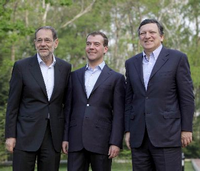Two frustrating EU summit meetings last week, with China and Russia, served to illustrate the EU's well-known difficulties in conducting foreign policy under its presently awkward institutional structure. These problems have propelled efforts to adopt the Lisbon Treaty, which will restructure how the EU manages its foreign policy representation and decision-making. Even with more coherent foreign policy machinery, however, the EU would still find it difficult to achieve its objectives in the case of difficult dialogue partners such as China and Russia.
The May 20 meeting in Prague with a visiting Chinese delegation marked the 11th EU-China summit since 1998. The Chinese government had canceled the previous session, scheduled for December 2008 in Lyon, to protest French President Nicolas Sarkozy's decision to meet with the Dalai Lama, the exiled Tibetan spiritual leader. Before last week's meeting, Serge Abou, head of delegation of the European Commission to China, optimistically expressed the EU's desire that the talks "reaffirm the ever-strengthening partnership of the European Union and China in addressing the major challenges facing the globe today -- environmental, economic, political and security."
But in a measure of the numerous differences still confronting that partnership, the two parties failed to reconcile the lengthy drafts submitted by both sides on issues of mutual concern. Instead, they issued a one-page joint statement filled with vague language that skirted all the key issues.

